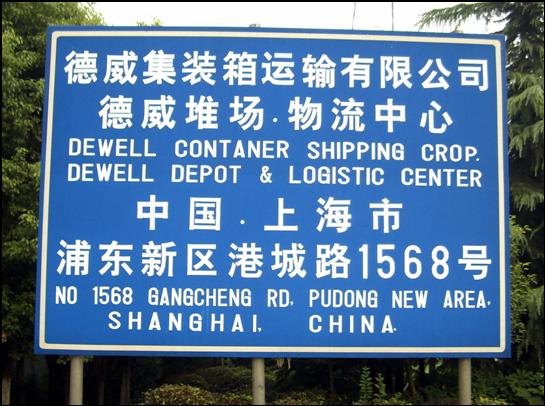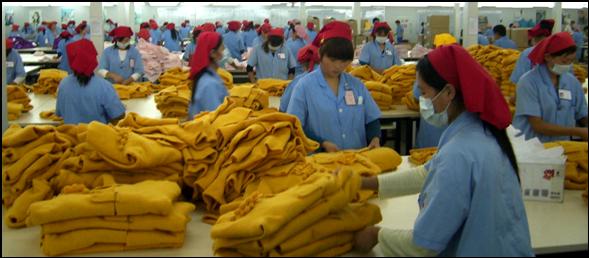Chinese NVOCCs – Moving From Tactical to Strategic
Shanghai, China
January 11, 2010
By
Richard Armstrong
Hong Kong and Shanghai are home to a group of capable NVOCCs (non-vessel operating common carriers) who are expanding from their tactical operations bases. De Well, Scanwell, Topocean, City Ocean and Hecny are all companies handling about 100,000 twenty-foot equivalent units (TEUs) a year. In addition to NVOCC capabilities, they are involved to varying degrees in airfreight, value-added warehousing and ground transportation activities. During our recent trip to Shanghai we visited two of these companies, De Well and Scanwell. Both are strong NVOCCs. Each has a set of unique offerings. Both are expanding into purchase order management and end-to-end supply chain solutions.
De Well
De Well has two businesses based in Shanghai. As an NVOCC, it handles 130,000 TEUs a year: 80% are to the U.S. Its second business is container depot operations. Five depots are operated in Pudong and Yangshan for storing and supplying containers to truckers for export shipments.
The NVOCC business is 60% DDP (delivered duty paid) and 40% FOB (free on board). Time Yang, the good natured owner of De Well, is aggressively seeking to expand the FOB business. Expansion of the FOB business will lead to more contact with U.S. based decision makers and greater supply chain management opportunities. About 40% of De Well’s business is clothing and other softgoods. The rest is a mix of general commodities. But like its Chinese counterparts, De Well is shut out of the more lucrative, higher value commodities including electronics. To expand its supply chain management capabilities, De Well has purchased a newly built warehouse in Rancho Dominguez, CA and hired an ex-Wal-Mart procurement manager. De Well has a strong Los Angeles, CA operation. The key person to talk to there is Mike Shaw. De Well’s proprietary IT is adequate for current volumes. U.S. AMS (automated manifest system) filings are made from Shanghai.
Gross margins in De Well’s NVOCC market segment from China to the U.S. are less than 10% as opposed to the traditional European industry standard of 20%. De Well buys significant capacity from 14 container lines. Some LCL (less-than-container load) is consolidated and a significant portion of De Well’s space is resold to other freight forwarding companies.

De Well’s other business, depot management, runs higher volumes and profits. At its five Shanghai locations, De Well stores and repairs containers for all of the container lines calling at the Shanghai ports of Pudong and Yangshan. The depots operate 24/7 and process 21.4 million containers a year. In addition, De Well operates 150 tractors out of three Pudong depots. De Well’s trucking operations deliver and pick up loads operating alongside a host of other Chinese trucking operations. Dispatch for trucking operations is at Pudong 1, the largest facility. All De Well trucks have GPS and radio control.
At Pudong 1, 10,000 containers are stored at one time. They are normally stacked seven high. Container locations are maintained using wireless yard control software.
De Well inspects all containers and repairs about 700 a day. Six Kalmar side-loaders are used to move trailers around. Each unit is on the yard control system.
In addition to the container depot and trucking terminal operations at Pudong 1, warehousing is done. At the time of our visit, 120 employees were involved in inspection and kitting operations. A proprietary WMS (warehouse management system) is used for location control in the warehouse.

Non-De Well drivers pay for container use at the front gate where trailer numbers and locations are provided. Seven days free time are given for each container.
In addition to opening an LA basin warehouse, Time Yang remains on the lookout for the right U.S. third-party logistics provider (3PL) to purchase to expand his company. He has built De Well to a thriving business in 19 years, and at 47 he’s got a lot of fire left.
Scanwell
Adam Ho started Scanwell in Hong Kong 28 years ago. In addition to its NVOCC operations, Scanwell – Hong Kong handles 40,000 tonnes of airfreight a year. About two-thirds of these shipments are garments for customers like J.C. Penney. In addition, Hong Kong manages truck transportation and distribution into the PRC for companies including Tyco Electronics. An important commodity for distribution is wine – most of it warehoused at NISKO, a partner company. Scanwell maintains contracts with 15 container lines in Hong Kong. Adrian Hassan, Ho’s son, is executive director of business development in Hong Kong.
In 1993, Solomon Wong initiated the PRC operations for Scanwell. Wong, like the rest of the top echelon at Scanwell, is bi-cultural and polished. Jeff Zhu, deputy general manager China, attended college in the U.S. and worked here for years. Wong lived and worked in the U.S. for six years.
Scanwell handles over 100,000 export TEUs a year. Sixty percent go to North America and 40% go to Europe. Apparel is the primary commodity handled through Shanghai. While Shanghai handles a sizable amount of airfreight, it is Scanwell’s primary ocean shipping location.
Wong discussed the available business openly. He pointed out that electronics and high-tech shipments are handled primarily by large global supply chain managers (SCMs) like DHL and UPS. He acknowledged that companies, like Scanwell, were relegated to lower value commodities but pointed out that margins on Scanwell’s airfreight business were twice what could be made on ocean freight.
Scanwell has eight U.S. offices and two Canadian offices. It also has significant coverage in Taiwan, Korea and Southeast Asia.
Summary
De Well and Scanwell are two strong but quite different Chinese NVOCC based logistics providers. They are part of a small group of Chinese companies that could grow significantly over the next few years either organically or by purchasing American companies. At the same time, they are attractive candidates for several American companies itching to be global SCMs. The guys we met are bright and very good businessmen. They have been successful in China and Hong Kong and expect to be in North America and the rest of the world.
Sources: A&A Primary Research, http://www.de-well.com/


